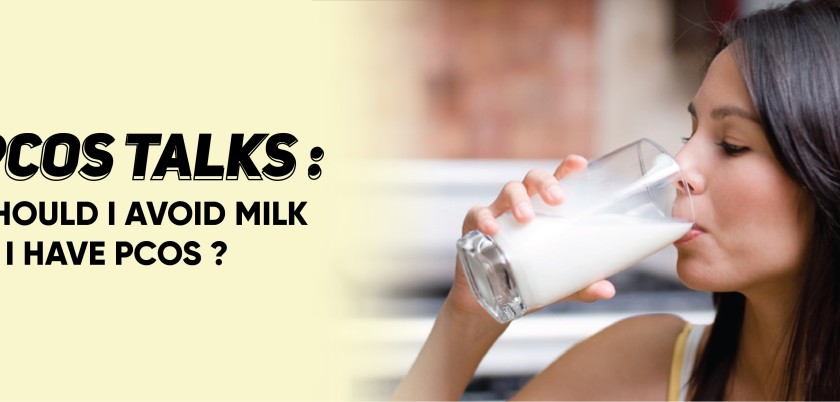
PCOS talks: Should I avoid milk if I have PCOS?
Hate it or love it, there is no negotiation for a cup of milk in Indian households. Milk is a wholesome food packed with many nutrients, however, ambiguity around milk consumption, when diagnosed with PCOS, is continually growing.
Research has found that a direct relationship exists between the consumption of milk and the risk of PCOS. In this article, we have addressed a few concerns about your daily milk consumption and how it could affect your PCOS.
1. Dairy and insulin-like growth factor-1
One of the biggest concerns in PCOS is increased insulin secretion causing hyperandrogenism(increase in male sex hormones). This in turn causes irregular periods, acne, and other symptoms. Drinking milk increases insulin-like growth factor-1(IGF-1) which acts similar to insulin and could worsen PCOS symptoms like acne.
2. Dairy and risk of diabetes mellitus
As we saw earlier, milk consumption results in increased amounts of insulin, which over some time cause insulin resistance. In women with PCOS, there is already an increased chance of acquiring type 2 diabetes mellitus due to metabolic abnormalities. Milk consumption has a fair chance of adding to the cause.
3. Lactose intolerance
Lactose intolerance is a genetic condition where your body won’t be able to process lactose, a carbohydrate present in milk. According to an article published in the American Journal of Clinical Nutrition around 60% of Indians were found to be lactose intolerant experiencing symptoms like bloating and abdominal discomfort. If you are already lactose intolerant, then milk consumption could aggravate your inflammation along with PCOS.
4. Commercial milk and its effects
The activities of the dairy industry have the potential to directly affect your development and prognosis of PCOS. Of late, to meet the demand many industries have started to inject the animals with hormone injections like oxytocin to increase production. As reported by CGSI (Consumer Guidance Society of India) in 2019, 85% of branded milk was found to be below the standards of fssai. These kinds of packaged adulterated milk could cause hormonal disturbances in your body affecting your natural metabolism.
5. Proteins in milk
Essentially there are two kinds of protein in milk. One is whey and the other is casein. In crossbred cows which produce A1 milk the casein protein is in the form of A1-Beta casein. This protein can potentially trigger acne and insulin resistance in your body. Indian bred cows like our desi cows produce A2 milk which contains A2-Beta casein which is a much safer option as they do not cause any inflammation in the body. However, the sad state is significant years of cross-breeding desi cows with jersey cows (foreign breed) have caused a considerable genetic variation.
Does this mean that you have to completely avoid milk?
Again, it could vary from individual to individual based on your symptoms. If you are lactose intolerant, then dairy must be off-limits. If finishing one cup of milk is already like eating a frog then you can easily let go of milk with no worries.
Some best alternatives include vegan milk like,
Almond milk – They are low in calories and saturated fat helping in weight management. And are very much appetizing too.
Oat milk – They are a good source of fiber and have no significant allergens.
Soy milk – They are rich in protein and ensure a balanced diet.
Coconut milk – Apart from being delicious, coconut milk increases good cholesterol (HDL) and lowers bad cholesterol (LDL).
Contact your health care professional to understand your specific requirements and to find the best alternative!






